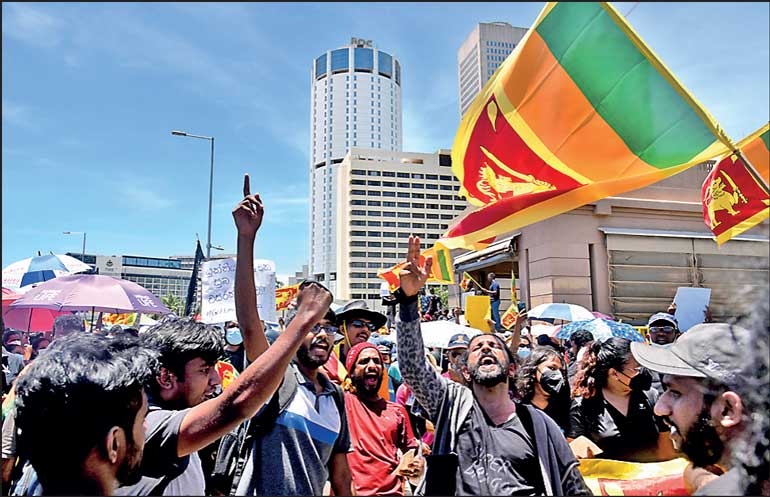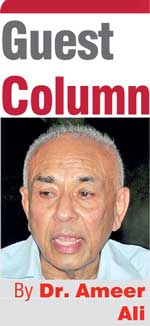Monday Feb 16, 2026
Monday Feb 16, 2026
Thursday, 28 April 2022 00:18 - - {{hitsCtrl.values.hits}}

Aragalaya demands a fundamental and wholesale change in the art of governing the country. Instead, the wheeling and dealing that is currently going on between the Opposition and Government, and within each of them in turn, makes one suspect whether the cause of the uprising is going to be betrayed and status quo would prevail at the end
“We the People”, is a unique preamble of the US constitution where people are mentioned in the first person. Although it has no innate or legal connotation, those three words express a fundamental truth, i.e., every act undertaken by the government in power, whether in terms of the constitution or otherwise, and the very existence of the government in power, implies that they are at the mercy of the people.
i.e., every act undertaken by the government in power, whether in terms of the constitution or otherwise, and the very existence of the government in power, implies that they are at the mercy of the people.
Whereas, the svasti of Sri Lanka’s 1977 constitution, mentions people in the third person. “The people of Sri Lanka … having entrusted to and empowered their representatives …”, it goes on. This relegation of the people to third place is reflected in the ongoing tug of wars, one between the Government and the Opposition and the other between the latter and Presidency. The two wars have completely ignored the immediate interest of the people, which is primarily economic.
Aragalaya, as articulated by an awakened young generation of all ethnic, linguistic and religious groups, represents the united voice of the people. It condemns wholesale the entire family of parliamentarians, who, while enjoying the salaries, perks and privileges given to them by taxpayers and occupying the legislature for more than two years, ended up bankrupting the country and brought unbearable sufferance to those who empowered them. The people are now occupying the streets and maidans and calling “Gota Go Home” and “No 225 in Parliament”, are blaming all of them and demanding a systemic change. It is more than two weeks since the Galle Face Green became the epicentre of aragalaya. Already one life had been lost in Rambukkana, but otherwise it had remained relatively peaceful. But for how long?
The longer the political instability continues, harder and costly would become solutions to the economic woos. The President has finally admitted that the approach to IMF should have been made much earlier. Even then, the economic situation had deteriorated so rapidly since that belated meeting with that institution, it is doubtful whether its assistance alone would be sufficient to reverse the decline.
Tightening monetary policy to keep inflation in check, increasing direct taxes to repair Government budget, and introducing flexible exchange rates to check currency speculation and blackmarket operations are necessary but not sufficient. Those measures were recommended by local economic experts long before IMF came into the scene. Those recommendations were totally ignored by an obscurantist President and an inept Government. An inbuilt aversion towards expert knowledge, rational thought and demonstrated truths had been a constant trait of the GR-MR dyarchy.
Finance Minister Ali Sabri seems to be upbeat and expressed confidence of “soaring support” for Sri Lanka’s struggle. In the meantime, China has reservations about restructuring its $ 2.1 billion debt in accordance with IMF’s plan. But IMF’s assistance for bailout is dependent on that restructuring. In other words, the Government’s economic revival strategy is running into difficulties because of its bungled foreign policies. From information available in social media, it appears that the dyarchy is being pulled apart in opposite directions by India and China. In sum, the inconclusive political tug of wars, delay in IMF bailout and foreign policy difficulties are combining to exacerbate the sufferance of the people. Does anyone care about them?
Economic recovery requires more than US dollars. Influx of foreign currency may help easing the current shortages in consumer essentials. But long-term recovery requires much more fundamental changes in what the country produces how it produces and where does it sell them. Apart from the three measures recommended by IMF, a long-term economic plan with intermediate targets is absolutely essential. Such a plan and targets would obviously mean structural changes in the economy. Aragalaya’s demand for systemic change cannot be accomplished without that structural change.
To draw up such a plan and implement it requires a government founded on principles of meritocracy, pragmatism and honesty. These were not qualities that ruled governments in the past and they are in serious deficit at present. Hence, aragalaya demands a fundamental and wholesale change in the art of governing the country. Instead, the wheeling and dealing that is currently going on between the Opposition and Government, and within each of them in turn, makes one suspect whether the cause of the uprising is going to be betrayed and status quo would prevail at the end. With such an outcome economic recovery would be long way off and people would continue to suffer.
What would be the fate of aragalaya then? Would it shift to another level with more direct action and different tenor? The President is basically a soldier in civilian garb and he and his family patriarch, the Prime Minister, are Sinhala Buddhist nationalists supported by elements from within the religious hierarchy. The clan has too much to lose by surrendering to the demands of protestors. How will the confrontation end? That is the sixty-four thousand dollars question.
(The writer is attached to Murdoch Business School, Murdoch University, Western Australia.)